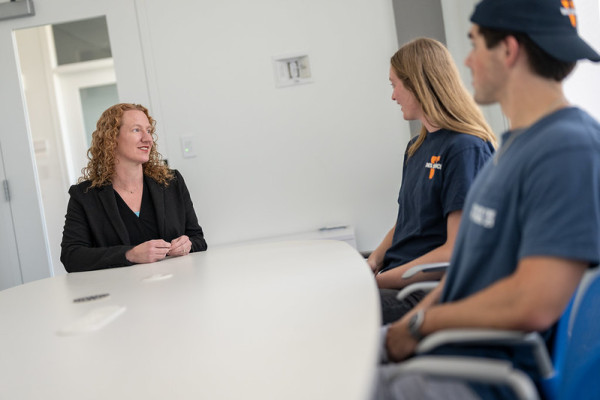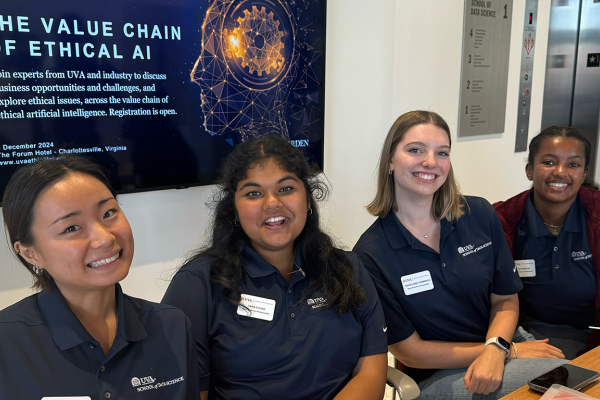
Discover the Dynamic Concentrations in UVA’s Bachelor of Science in Data Science

For undergraduate students at the University of Virginia (UVA), the three-year B.S. in Data Science (BSDS) program prepares you to become an expert in the field and work at the cutting edge of a new discipline in career paths across public and private industry. To match your interests and career goals, the BSDS offers a variety of dynamic concentrations, allowing you to tailor your degree. All BSDS students will select a core concentration in Analytics, Systems, Design, or Value, providing a strong foundation in data science.
You can further customize your experience with an optional collaborative concentration that connects data science with other disciplines across the University: accounting, astronomy, environmental science, human movement and physiology, mathematics, and neuroscience. These concentrations not only prepare you for industry roles and research opportunities but also empower you to apply data science skills to real-world challenges, making your degree as unique as your ambitions.
Core Concentrations
All BSDS students select one of the following concentrations from the School of Data Science. Students will select three courses for their chosen concentration. The four core concentrations are:
Analytics Concentration
- DS 4121 - Foundations of Text Analytics (3 credits)
- DS 4125 - Introduction to Deep Learning (3 credits)
- DS 4126 - Computer Vision (3 credits)
- DS 5122 - Large Language Models (3 credits)
Systems Concentration
- DS 4220 - IoT and Sensor Data (3 credits)
- DS 4221 - Advanced Databases (3 credits)
- DS 5220 - Advanced Cloud Computing (3 credits)
- DS 5221 - Stream Processing (3 credits)
Design Concentration
- DS 4320 - Data by Design (3 credits)
- DS 4329 - Data Design Studio (3 credits)
- DS 5320 - Human-Centered Design (3 credits)
Value Concentration
- DS 4322 - Technology Regulation and Data Science (3 credits)
- DS 4423 - Data, Technology, and Society (3 credits)
- DS 5420 - Mainframes to Memes (Past, Present, and Future of Mainframe Technology (3 credits)
Note: Students may not double-count courses across concentrations.
Optional Concentrations
The concentrations outlined below provide an overview of the diverse pathways available in the BSDS program, each designed to help you tailor your degree to your unique interests and career aspirations. For detailed course information, including the most recent listing of concentrations, required courses, labs, electives, and other prerequisites, visit the BSDS Admissions Concentration page.
Analytical Accounting Concentration
The Accounting Analytics Concentration provides students with the skills to navigate the rapidly evolving financial landscape by combining data science expertise with foundational accounting knowledge. Students will learn to harness tools like predictive modeling, data visualization, and advanced analytics to uncover insights from financial data, enhance decision-making processes, and detect patterns that drive strategic business outcomes.
This interdisciplinary approach prepares graduates to tackle challenges such as fraud detection, financial forecasting, and performance analysis, making them invaluable assets in fields ranging from corporate finance to auditing and consulting. By bridging the gap between data science and accounting, students are uniquely equipped to thrive in a world where data-driven solutions are transforming the financial industry.
This concentration consists entirely of courses at the UVA McIntire School of Commerce. It is also designed to fulfill most of the prerequisites required to apply for McIntire’s M.S. in Accounting. Data science students who completed the Accounting Analytics Concentration and are interested in pursuing additional studies in accounting are encouraged to take an additional elective (COMM 3120 - Intermediate Accounting II) in order to apply to the master's program.
Astronomy Concentration
The Astronomy Concentration allows students to explore the universe through the power of data. By combining data science skills such as machine learning, big data analysis, and computational modeling with the study of celestial phenomena, students gain the tools to analyze vast datasets from telescopes, satellites, and space missions.
This interdisciplinary approach enables students to address questions about the origins of the universe, the behavior of stars and galaxies, and the potential for life on other planets. Graduates with this concentration are prepared to contribute to cutting-edge research in astrophysics, space exploration, and cosmology, as well as to pursue careers in data-driven industries that value critical thinking and advanced analytical capabilities.
Students interested in this concentration should take MATH 1210 or MATH 1310.
Environmental Science Concentration
The Environmental Science Concentration equips students to tackle pressing environmental challenges through the lens of data. By combining data science techniques such as geospatial analysis, machine learning, and predictive modeling with the study of ecosystems, climate systems, and sustainability, students gain the skills to analyze complex environmental data and develop innovative solutions.
This interdisciplinary approach prepares students to address critical issues like climate change, resource management, biodiversity conservation, and environmental policy. Graduates with this concentration are uniquely positioned to make an impact in fields ranging from environmental consulting to renewable energy and governmental or non-profit organizations focused on sustainability and conservation.
The Environmental Sciences Concentration requires students to complete at least three courses: one core course with lab and two elective courses at the 3000-, 4000-, or 5000-level.
Human Movement and Physiology Concentration
The Human Movement and Physiology Concentration empowers students to explore the complexities of the human body through data-driven insights. By combining advanced data science techniques such as statistical modeling, machine learning, and wearable technology analysis with the study of biomechanics, exercise science, and physiology, students gain the tools to analyze movement patterns, optimize performance, and advance healthcare interventions.
This interdisciplinary approach prepares graduates to address challenges in areas such as sports science, rehabilitation, injury prevention, and human performance research. With this unique skill set, students are equipped to contribute to innovations in health technology, physical therapy, and personalized wellness solutions.
Mathematics Concentration
The Mathematics Concentration provides students with a rigorous foundation in the mathematical principles that underpin modern data science. By combining advanced mathematical techniques such as linear algebra, probability, optimization, and numerical analysis with hands-on data science tools like machine learning and statistical modeling, students develop the analytical skills to solve complex, data-driven problems.
This interdisciplinary approach equips graduates to tackle challenges in fields such as finance, cryptography, artificial intelligence, and scientific computing, while also preparing them for graduate studies in mathematics or related disciplines. With this concentration, students are uniquely positioned to excel in careers requiring deep quantitative reasoning and computational expertise.
Students interested in the Mathematics Concentration should take MATH 1310 and MATH 1320; completion of MATH 1320 is a prerequisite for upper-division MATH courses. Many upper-division mathematics courses have a prerequisite of either MATH 3310 (Basic Real Analysis) or MATH 3354 (Introduction to Abstract Algebra).
To complete the Mathematics Concentration, students must complete a course in Linear Algebra, then one 3000-level course, and one course that is 4000-level or higher. The Mathematics Concentrations has multiple suggested course pathways for completion.
Neuroscience (NESC) Concentration
A concentration in neuroscience offers students a unique opportunity to explore the intersection of data and the brain, equipping them with skills to solve some of the most complex challenges in science and medicine. By combining data science techniques like machine learning, statistical modeling, and data visualization with the study of brain function, behavior, and cognition, students gain the tools to analyze large-scale neural data, develop innovative approaches to neurological research, and contribute to advancements in areas such as mental health, neurodegenerative disease, and brain-computer interfaces.
This interdisciplinary focus not only prepares students for careers at the cutting edge of neuroscience and technology but also positions them as leaders in a rapidly evolving field where data-driven insights are shaping the future of healthcare and human understanding.
Stay Informed and Shape Your Path
The BSDS program at the University of Virginia empowers students to customize their education through core and collaborative concentrations that blend technical expertise with interdisciplinary applications. Whether you focus on Analytics, Systems, Design, or Value through the core concentration, or opt to expand into fields like neuroscience, environmental science, or accounting, these concentrations equip you to tackle real-world challenges. By integrating foundational coursework with emerging topics, the BSDS program ensures you’re ready to innovate, lead, and make an impact in your chosen career path.
As the BSDS program evolves to stay at the forefront of data science education, check the BSDS Admissions Concentration page for the latest updates. Find the most recent listing of concentrations, required courses, labs, electives, and other prerequisites. Stay informed and explore new opportunities to shape your data science journey.






